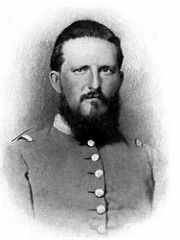Washington Saturday Feb. 21st 1863.
It was a mild pleasant morning but is quite cold tonight with indications of more snow. In the office all day as usual. Not much to do, read the news papers and old “Pepys Diary” about half the day, left him in the midst of the “great Plague in London” summer of 1664, more than a thousand per day dying of it. When it first broke out in a house, the House was closed and a red cross was Marked upon the door, and “The Lord have Mercy on us” written under it. He was an Educated man but like every body else at that time was realy ignorant and believed in charms. He was silly enough to carry a hares foot in his pocket to protect himself from the cholic to which complaint he was subject. I have been this evening to hear Mrs Swishelm Lecture upon the Indian Murders in Minnesota last summer. She is a small delicate looking woman. She has been a very beautiful woman and may still be called beautiful for a lady over 40 or 45 yrs. She had a crowded House and her lecture was fine and quite characteristic of the woman. It had many very fine hits in it at rebels of the South and sympathisers at the North as well as at the “Noble Indian” “as the puling sentimentalists of East call him.” She was frequently applauded and sometimes most vociferously. I took a walk on the Ave after leaving the office before dinner. The Ave seemed to be more crowded than ever. The “Currency Bill” pass the “house” last night, good so far.









